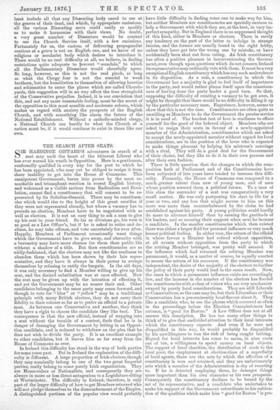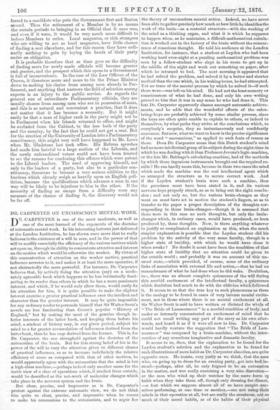THE SEARCH AFTER SEATS.
SIR HARDINGE GIFFARD'S adventures in search of a seat may melt the heart of the bitterest Liberal who has ever nursed his wrath in Opposition. Here is a gentleman, confessedly qualified in every way for the post to which he has been appointed, who may yet be obliged to resign it from sheer inability to get into the House of Commons. This omnipotent Government, borne into power by the most re- markable and triumphant reaction in recent English history, and welcomed as a visible saviour from Radicalism and Revo- lution, cannot find a constituency that will consent to be re- presented by its Solicitor-General. There may be constituen- cies which would rise to the height of this great sacrifice if they were not represented already, but where a vacancy has to precede an election, Members have to be negotiated with as well as electors. It is not an easy thing to ask a man to give up his seat to your friend. So far as divisions go, his vote is as good as a Law Officer's, but if he is asked to retire and de- clines, he may take offence, and vote uncertainly for ever after. Happily, Members of Parliament occasionally want things which the Government have to give away, and obscurity with a baronetcy may have more charms for them than public life without a shadow of a title. But then constituencies are so oddly-fashioned, that the electors may not like the readiness to abandon them which has been shown by their late repre- sentative, and they have it always in their power to avenge themselves by refusing to ratify the bargain. In the old days, it was only necessary to find a Member willing to give up his seat, and the desired substitution was at once effected. Now the seat may be given up with the intention of effecting it, and yet the Government may be no nearer their end. Other candidates belonging to the same party may come forward, and though to vote for "blue" or " yellow " may be a traditional principle with many British electors, they do not carry their fidelity to their colours so far as to prefer an official to a private man. As between one Conservative and another, they think they have a right to choose the candidate they like best. The consequence is that the new official, instead of stepping into a seat without the trouble of a contest, finds that he is in danger of damaging the Government by letting in an Opposi- tion candidate, and is reduced to withdraw on the plea that he does not wish to divide the party. It is an excellent example to other candidates, but it leaves him as far away from the House of Commons as ever.
In Ireland this difficulty has stood in the way of both parties for some years past. But in Ireland the explanation of the diffi- culty is different. A large proportion of Irish electors, though they may nominally belong to one of the two great Imperial parties, really belong to some purely Irish organisation. They are Home-rulers or Nationalists, and consequently they are always in more or less direct antagonism to a Legislature sitting at Westminster. The difficulty in Ireland, therefore, is only part of the larger difficulty of how to get Members returned who will not pledge themselves to the dismemberment of the Empire. A distinguished partisan of the popular view would probably have little difficulty in finding some one to make way for him, but neither Members nor constituencies are specially anxious to help a Government with which they are, at the best, in very im- perfect sympathy. But in England there is no suppressed thought of this kind, either in Members or electors. There is rarely any tendency on the part of the latter to indulge in strange fancies, and the former are usually found in the right lobby, unless they have got into the wrong one by mistake, or have accidentally been shut out from voting. An Irish constituency has often a positive pleasure in inconveniencing the Govern- ment, even though upon questions which do not concern Ireland its representative may ordinarily vote with them. It must be a very exceptional English constituency which has any such malevolence in its disposition. As a rule, a constituency in which the Government has a majority is glad to feel itself of importance in the party, and would rather plume itself upon the conscious- ness of having done the party leader a good turn. So that, supposing the difficulty of creating a vacancy to be got over, it might be thought that there would be no difficulty in filling it up by the particular necessary man. Experience, however, seems to show that this is not the case. Constituencies are often quite as unwilling as Members to do the Government the precise service it is in need of. The hardest test of love is readiness to efface yourself for the good of the beloved object. Members who are asked to resign their seats in favour of a newly-appointed member of the Administration, constituencies which are asked to accept the newly-appointed member without regard for local considerations, are in the position of the lover who is expected to make things pleasant by helping his mistress's marriage with a rival. They will do a good deal for the Government of their choice, but they like to do it in their own persons and after their own fashion.
There is little question that the changes to which the com- position both of Parliament and of the Constituencies have been subjected of late years have tended to increase this diffi- culty. Formerly, the House of Commons was composed to a much greater extent than now of young men, and of men whose position secured them a political future. To a man of this class the surrender of a seat was comparatively a very small matter. He was only postponing his start in life for a year or two, and any loss that might accrue to him on this score was more than counterbalanced by the claim he had established against his party. A young politician could hardly do more to advance himself than by earning the gratitude of his leaders, and so securing their support when next he became a candidate. In the smaller constituencies which then existed there was either a larger field for personal influence or very much keener political feeling. In either case, the return of the official in whose favour a Member had retired without opposition, at all events without opposition from the party to which the retiring Member belonged, was pretty well assured. If the influence which had returned the retiring Member was paramount, it would, as a matter of course,- be equally exerted to secure the return of his successor. If the constituency was independent, the desire of the majority of the electors to further the policy of their party would lead to the same result. Now, the cases in which a paramount influence exists are exceedingly few, and the increase in the number of the electors has flooded the constituencies with a class of voters who are very muchmore swayed by purely local considerations. They are still Liberals or Conservatives, as the case may be, but their Liberalism or their Conservatism has a pre-eminently local flavour about it. They like a candidate who, to use the phrase which occurred so often in the proceedings before the Election Commissioners last autumn, is " good for Boston." A Law Officer does not at all answer this description. He has too many other things to think of to give that undivided attention to their local interests which the constituency expects. And even if he were not disqualified in this way, he would probably be disqualified by his unwillingness to run the risk of being caught bribing. Regard for local interests has come to mean, in nine cases out of ten, a willingness to spend money on local objects.
The support of local charities, the distribution of coals to the local poor, the employment at election-time of a superfluity of local agents, these are the acts by which the affection of a constituency is won and retained, and they are unfortunately acts which a member of the Administration is shy of resorting to. If he is detected employing them, he damages things more important than his own character or his own prospects. Consequently the constituency declines to be bound by the act of its representative, and a candidate who undertakes to make his support of the Government subordinate to his cultiva- tion of the qualities which make him " good for Boston " is pre- fared to a candidate who puts the Government first and Boston second. Thus the retirement of a Member is by no means the certain prelude to bringing in an Official that it once was, and even if it were, it would be very much more difficult to induce Members to retire. Local magnates, or rich strangers who are willing to act as local magnates, have little chance of finding a seat elsewhere, and for this reason they have ordi- narily • nothing to gain by laying the heads of their party under an obligation. It is probable therefore that as time goes on the difficulty of finding seats for newly made officials will become greater and greater, and the prospect which this opens to a Government is full of inconvenience. In the case of the Law Officers of the Crown, it threatens more and more to tie the Prime Minister down to making his choice from among men already in Par- liament, and anything that narrows the field of selection among experts is an injury to the public service. As regards the general run of subordinate Parliamentary officials, they are usually chosen from among men who are in possession of seats, and this is so natural and convenient a practice, that it does not matter that it has become a necessity. But it might easily be that a man of higher rank in the party might not be in Parliament when his friends returned to office, and might be excluded from the Cabinet, to the loss both of the party and the•country, by the fact that he could not get a seat. But for the erection of the University of London into a Parliamentary constituency, this might very well have happened to Mr. Lowe when Mr. Gladstone last took office. His Reform speeches had made him hateful to a large section of the Liberals, and the newly enfranchised voters could not have been trusted to see the reasons for condoning this offence which were patent to the Liberal leaders. The need of approving himself, not only to the leaders of a party, but also to a particular con- stituency, threatens to become a very serious addition to the burdens which already weigh so heavily upon an English poli- tician, because the qualifications which advance a man in one way will be likely to be injurious to him in the other. If the necessity of finding an escape from a difficulty were any measure of the chance of finding it, the discovery would not be far off.



































 Previous page
Previous page